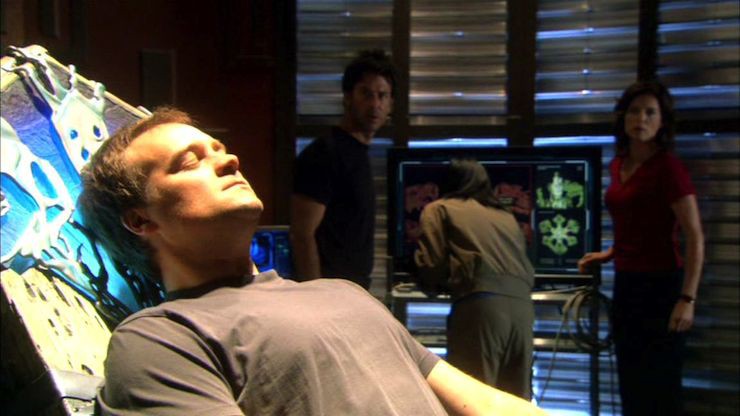Stargate Atlantis Season 3
Executive producers: Robert C. Cooper, Brad Wright, Joseph Malozzi, Paul Mullie, N. John Smith
Original air dates: July 14, 2006 – February 5, 2007
Mission briefing. The Daedalus and the Orion are dispatched to stop the two Wraith hive ships, and they’re assisted by Sheppard (who hid his 302 on one of the ships before it went to hyperspace), Michael (who has realized that the Wraith consider him an outcast), and McKay and Ronon (who manage to escape from the cocoon). One hive ship and the Orion are both destroyed, and they use the retrovirus to turn the Wraith on the surviving ship into amnesiac humans, and bring the ship and them home. But the Wraith start to remember who they are and, led by Michael, they make their escape.
Michael starts performing experiments on humans throughout the galaxy, proving himself to be an enemy to both humans and Wraith alike, while using Beckett’s retrovirus as a starting point for a weapon to be used against both.
In addition to the Wraith and Michael, the expedition discovers another enemy: the Asurans. Believing them at first to be Ancients who survived the Wraith war, they turn out to be humanform replicators, created by the Ancients to fight the Wraith (since the Wraith can’t feed on them), but who rebelled and formed their own society. They make three separate attempts to take Atlantis.
One of those occasions occurs shortly after Daedalus—while setting up an intergalactic gate bridge that will permit stargate transit between galaxies without need of a ZPM—discovers a Lantean vessel travelling at relativistic speeds between Pegasus and the Milky Way. They reclaim Atlantis as their own, sending the expedition home, only to find themselves invaded by the replicators. Weir, Sheppard, and the gang re-take the city from the replicators, with help from O’Neill and Woolsey (the only survivors of the massacre, originally there as liaisons to the Lanteans).
A group of replicators prefer peace and wish to eventually ascend like their creators did. One of them, Niam, is discovered and turned against our heroes, and infects Weir with nanites that make her think she’s back on Earth, and there is no Stargate project.
The (temporary) Lantean reoccupation of the city leads to the discovery of other parts of the city that the expedition hadn’t been able to restore yet. In one case, McKay finds an ascension-assistance device that makes him super-duper-smart, but will also kill him or ascend him, neither of which he wants. Another Ancient weapon they discover emits radiation that creates explosive tumors in anyone exposed to it, the discovery of which claims five lives, including that of Beckett. Also, an older lab they found shortly after arriving that seemed to have a civilization-creation game turns out to influence an actual world with actual people, and McKay and Sheppard have to convince their respective “players” that it’s only a game and they shouldn’t go to war.
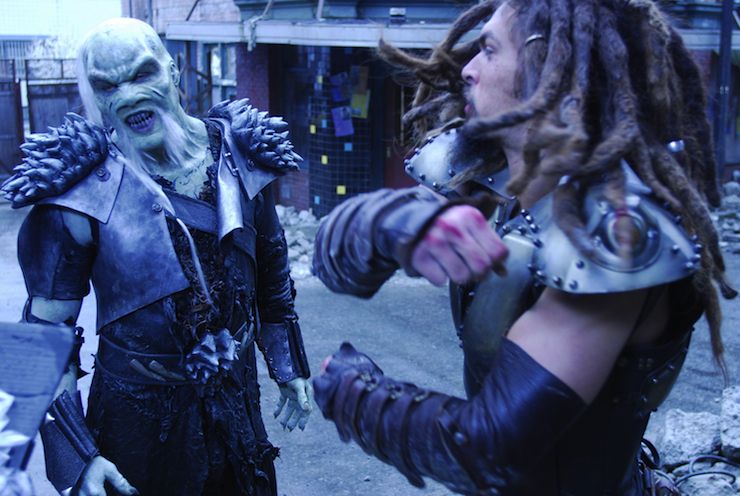
Meanwhile, the exploration of Pegasus continues. Ronon is recognized and betrayed by people whom he visited as a runner. A sleeper ship is discovered, and the team’s attempt to revive the crew is complicated by one of the two people charged with doing so going mad and killing himself. Closer to home, they find an undersea Lantean base—and also a Wraith Queen in stasis. They twice encounter a con man named Lucius Lavin, who uses a “love potion” and a personal force field to further his own ends. The second occasion is one of two times they deal with Kolya, who is angry that Radim managed a coup without him and wants to take his rightful place as Cowen’s replacement as ruler of the Genii. He uses a captured Wraith to torture Sheppard into cowing the expedition, and later he attacks the world Lavin is using as his home base.
That captured Wraith (who will eventually be nicknamed Todd) becomes a most reluctant ally, for his Genii imprisonment has weakened his position among his people, and both the expedition and Todd find each other useful periodically.
The Genii are also responsible for tampering with a Wraith device that makes everyone on the planet see things, which winds up setting everyone against everyone else (except Teyla, who’s immune), and kills most of another team.
McKay’s sister Jeannie Miller has come up with a bridge between parallel universes, and she’s conscripted by Carter to help McKay and Zelenka re-create the power source from “Trinity,” though it doesn’t work (and almost destroys a parallel universe, from whom we meet their McKay, who’s a much cooler, but still very annoying, version nicknamed “Rod”).
And then a new 304 vessel, the Apollo, arrives with its hard-nosed commander, Colonel Abraham Ellis, who has a plan to take out the new ships the replicators are building. Over Weir’s objections that this will lead to a retaliatory strike on Atlantis, Ellis undertakes the mission. While it is successful, Weir’s prediction turns out to be on the button: the Asurans attack the base with a beam weapon that forces the expedition to at first sink the city to make the beam more diffuse (which isn’t as useful as they’d hoped) and then to send the ship into space to escape the beam. Unfortunately, they do not escape unscathed as Weir is critically injured, and the hyperdrive conks out early, leaving the city adrift between solar systems.
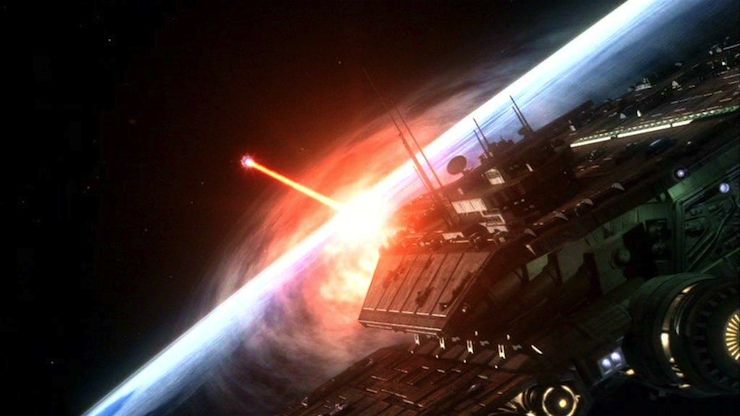
Best episode: “First Strike.” A damnably effective cliffhanger, as this is the only episode in which the replicators feel like a genuine threat. Michael Beach’s Ellis is a good foil for Weir, the threat of the destructive beam is real, the desperate attempts to fix the problems are clever and imaginative and suspenseful, and it ends with the city adrift, Weir on death’s door, and time running out.
Runners up: “The Real World,” an excellent showcase for Torri Higginson, good use of guest stars Alan Ruck and Richard Dean Anderson, which elevate it above the rather clichéd plot.
“Common Ground,” which introduces Christopher Heyerdahl’s Todd (a name he won’t get until next season), a superb character. The relationship between Todd and Sheppard that develops is excellent, and the dynamics here are fantastically realized, between Atlantis and Radim’s Genii regime, between Kolya and Radim, between Todd and Sheppard, and between Sheppard and Kolya.
“The Return, Part 2,” which is a solid adventure story in the true Stargate tradition, aided by simply delightful snark between O’Neill and Woolsey. It’s only too bad this is the only instance of the Anderson-Robert Picardo double act, because they pulled it off beautifully.
“The Game,” a very effective story that beautifully shows up the characters of Sheppard and McKay, as their Lantean version of Civ4 winds up influencing an entire planet. I love how the leaders of the two nations parrot their “oracle’s” philosophies and ideas.
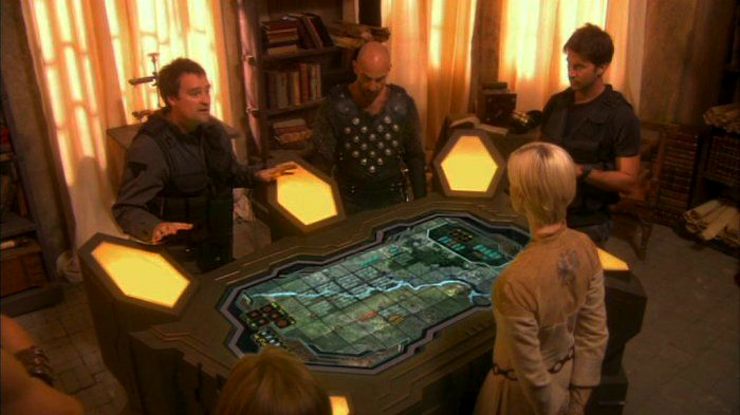
Plus “Tao of Rodney,” a fun vehicle for David Hewlett, “The Ark,” an exciting story of the team getting stuck in someone else’s crisis and having to fix it, “Echoes,” a classic Stargate mystery/scientific adventure, “Submersion,” a tense vehicle for Rachel Luttrell, and “McKay and Mrs. Miller,” which works mostly thanks to the magnificent banter between siblings (real and fictional), papering over the fact that it’s pretty much two completely different episodes (McKay and his sister! McKay from an alternate universe!) unconvincingly smashed together.
Worst episode: “Progeny.” Quite simply the most unimaginative episode of Atlantis ever, as it’s pretty much beat-for-beat the same plot as SG-1‘s “Unnatural Selection.” Substitute Niam for Fifth, Oberoth for First, Weir for Carter, and it’s the same damn thing. It feels tired and desperate, and, to make matters worse, goes to the trouble of casting the great David Ogden Stiers as Oberoth and then does basically nothing with him (true of both of Stiers’s appearances in this season).
Runners up: “The Return, Part 1,” as dreadful as its conclusion is exciting, as the promise of the return of a group of Lanteans to their own city is flushed away by an off-camera replicator invasion. The new status quo of the team back on Earth is never convincing, and O’Neill’s standing orders to nuke Atlantis rather than try a rescue is spectacularly out of character for an O’Neill whose desire to not leave people behind is so strong that it influenced a Tok’ra symbiote in “Abyss.” It’s only there to create artificial tension as they “fool” Landry, which just doesn’t work on any level.
“Sunday,” which actually isn’t a bad episode for the most part, but in the end turns manipulative and stupid. The Marine who took the tumor from Beckett should have been right outside the door, not making him walk all the way down a hall, and the ending has huge pomp and circumstance for Beckett and utterly forgets that four other people also died—but they’re not in the opening credits so, y’know, who gives a crap about them, right? Atlantis‘s record on making the deaths of side characters matter is usually better than this, which makes the fuss over Beckett to the exclusion of the others who died (including the Marine standing two feet from Beckett, not to mention Hewston who was allegedly close enough to Teyla to be having lunch with her) is appalling. Also, frankly, Beckett’s death just feels artificial and constructed, draining the tragedy from it (and of course it will be reversed next season, kinda).
Can’t we just reverse the polarity? Carter and McKay come up with a “gate bridge” between the Milky Way and Pegasus galaxies by daisy-chaining stargates at their maximum distance from each other throughout the void between them. Midway Station is under construction at the halfway point, with Milky Way gates taken from uninhabited planets on one side, Pegasus space gates from uninhabited planets on the other side (though they may have taken some planetside ones, too, that’s not clear). Either way, it is intended to allow for easy transportation between Earth and Atlantis without having to use a ZPM. Midway Station will be operational at the top of next season, and destroyed toward the end of it.
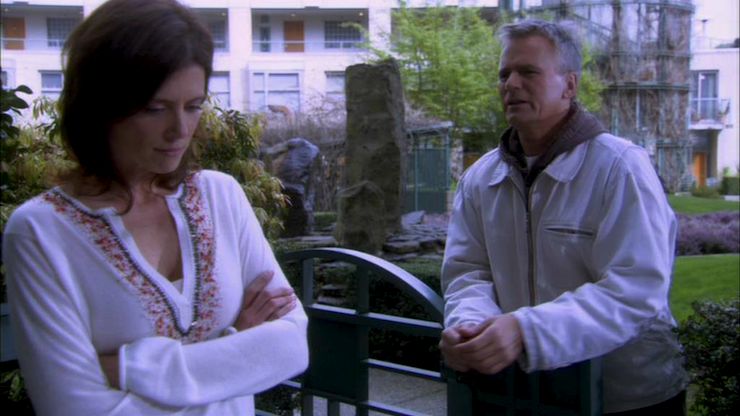
These are not the decisions I imagined making. Weir’s decisions are second-guessed by the IOA at the top of the season, but they ultimately let her stay on as head of the expedition, though not after being observed by Woolsey. She is infected with nanites that give her delusions in “The Real World” (that will become important next season), and when the Tau’ri are kicked out of Atlantis in “The Return,” she finds herself at loose ends, unwilling to take up her old career. She also flirts with a scientist in “Sunday” and butts heads with Ellis when he brings the Apollo by in “First Strike.”
Yes, but I’m also incredibly lazy. Sheppard has to work with Michael to save everyone in “No Man’s Land,” work with Todd to escape from Kolya in “Common Ground,” and disobey orders to rescue O’Neill and Woolsey and recover Atlantis in “The Return.” We also get a look at his past, via his memories of an Afghanistan mission in “Phantoms,” and are told he has an ex-wife in “Sunday.” (We’ll meet the ex in question next season.)
I know everything about everything. McKay tries to re-create the experiment from “Trinity” with help from his sister in “McKay and Mrs. Miller,” and instead meets a cooler version of himself who tells him that he’s about to destroy a universe. He also gets hit with an experimental device that makes him incredibly smart, but which will also force him to ascend or die, in “Tao of Rodney.”
They are good trading partners. Teyla’s Wraith DNA proves problematic as her proximity to a Wraith Queen in stasis in “Submersion” wakes the Queen up.
We’re in another galaxy, how much more out can we get? Beckett’s retrovirus is indeed weaponized, though it doesn’t take permanently—indeed, he makes Michael human again, but he and several other Wraith start to get their memories back and change back. And then he dies taking an explosive tumor out of a scientist.
I was just gonna blow it up. Ronon is recognized by a planet he visited when he was a runner. The people are not happy to see him, as he brought the Wraith down on them, and they sell him out to the Wraith in the hopes of being spared (a forlorn hope, as the Wraith wipe them out anyhow). The Wraith turn him back into a runner, and send him to the ruins of Sateda to hunt him.
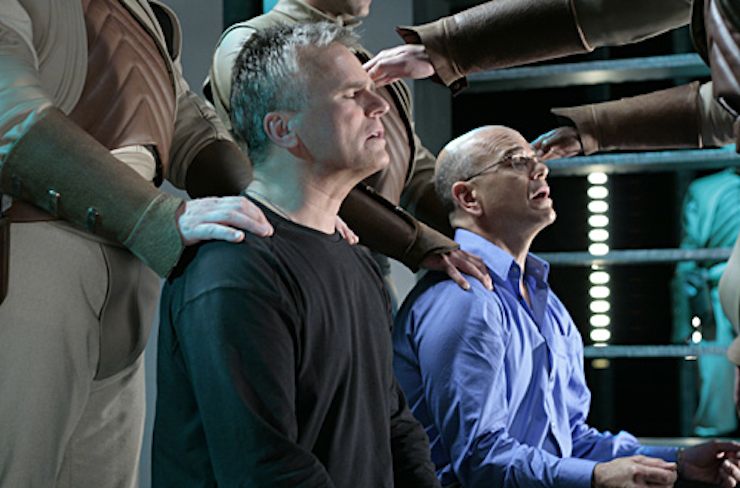
For cryin’ out loud! O’Neill is sent to Atlantis to deal with the Lanteans who are rescued between galaxies, and then gets caught up in the Asuran invasion, along with Woolsey. He aids Sheppard’s team in their rescue. His final advice to Weir is “Next time, bring Carter.”
In addition, O’Neill is part of Weir’s Niam-induced delusion that the Stargate program is part of a psychic break she suffered during a negotiation.
It might work, sir. Carter is the one who seeks out McKay’s sister when she comes up with brilliant math. She also makes fun of their Canadian-ness, which is an entertaining in-joke, since Amanda Tapping is just as Canadian as the Hewletts…
You can go ahead and burst into flames now. When the Tau’ri are kicked out of Atlantis, Landry is in charge of reassigning them, including giving Sheppard his own SG team, and he also figures out that Weir and Sheppard are leading a commando raid against orders, but too late to do anything about it. He is also confident that Weir can take whatever the IOA can dish out.
Wayward home for out-of-work genre actors. The Dead Zone‘s David Ogden Stiers (truly best known for his role as Winchester on M*A*S*H) brings quiet menace to the role of Oberoth. Enterprise-B Captain Harriman from Star Trek Generations Alan Ruck (truly best known for Ferris Bueller’s Day Off) appears as a psychiatrist in Weir’s “The Real World” delusion, while his fellow Spin City star Richard Kind, who was in the original Stargate film in a different role, shows up in two episodes as Lavin. Past My Best Friend is an Alien and future Flash Gordon star Panou appears as an Asuran. The same year that her fellow Firefly cast member Morena Baccarin became a recurring antagonist on SG-1, Jewel Staite debuted her role of Keller, which will become recurring in season 4 and regular in season 5. Megan Leitch (Mulder’s sister on The X-Files) plays a Lantean commander, while her XF co-star Mitch Pileggi is back as Caldwell (though his role was reduced due to his role on Day Break the same season, which led to the casting of Michael Beach as Ellis and bringing in the Apollo in “First Strike”). Also back for more this season are Robert Picardo as Woolsey, Connor Trinneer as Michael, and Robert Davi as Kolya.
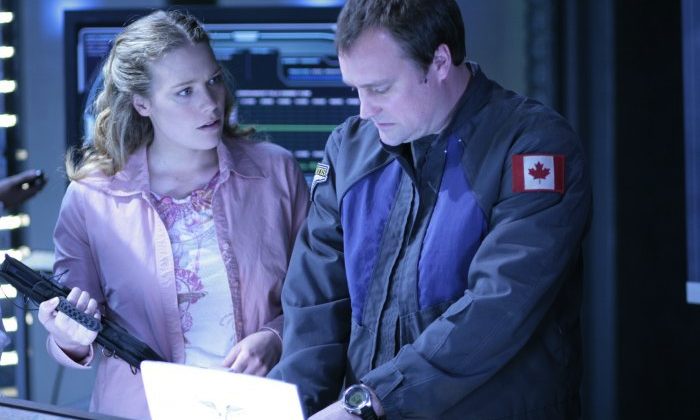
Trivial matters. In the first season, a scripted reference to McKay’s brother was changed to his sister at David Hewlett’s request because his real-life sister Kate Hewlett is also an actor, and he was hoping that they could eventually cast her as McKay’s sister. His wish came true this season in “McKay and Mrs. Miller,” with Kate cast as Jeannie McKay Miller, a role she would return to thrice more.
After being replaced physically by Brent Stait in “Allies,” Connor Trinneer returns to play Michael, a role that recurs throughout this and the next two seasons.
This aired simultaneously with SG-1‘s tenth and final season. Torri Higginson, Joe Flanigan, David Hewlett, David Nykl, and Chuck Campbell all guest star in SG-1‘s “The Pegasus Project,” which takes place primarily in the Pegasus galaxy (with the Odyssey also providing supplies and such for Atlantis, as the Daedalus‘s hyperdrive is still on the fritz at that point in the timeline). It was filmed at the same time as “Sateda,” which focused on Ronon, freeing up the other actors. In addition, the Milky Way’s conflict with the Ori is mentioned by Weir as a reason why two of the ZPMs they inherit from the Lanteans after “The Return” are sent back to Earth, for use by the Antarctic base and the Odyssey.
Hewlett shows up a second time on SG-1 in “The Road Not Taken,” one of two times he appears as an alternate-reality version of McKay in this TV season, the other being in “McKay and Mrs. Miller,” when “Rod” McKay comes through to stop McKay and Miller’s experiment.
Meanwhile, SG-1 regulars Richard Dean Anderson, Amanda Tapping, Beau Bridges, Bill Dow, Robert Picardo, and Gary Jones all appear at various points, and we see SG-1‘s Cheyenne Mountain sets used in “No Man’s Land,” “Misbegotten,” “The Real World,” and “The Return.”
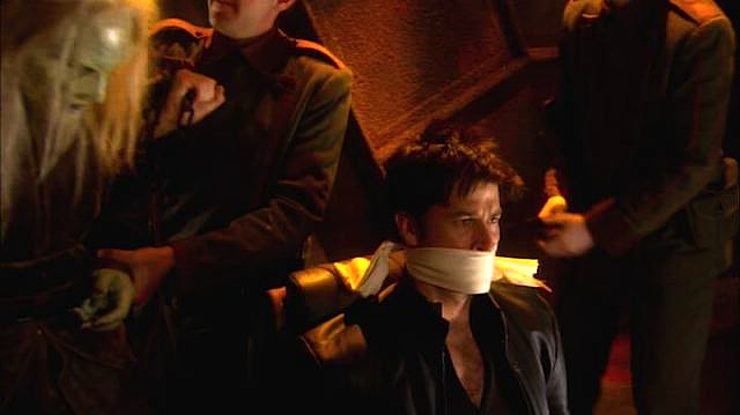
Richard Kind is the third actor from the original Stargate film to appear on one of the TV series, and the only one who didn’t play the same role. The others were Erick Avari and Alexis Cruz, who continued their roles of Kassuf and Skaara from the film on many episodes of SG-1.
The personal force field from “Hide and Seek” makes two returns. “Rod” McKay uses it to protect himself when he comes from an alternate reality in “McKay and Mrs. Miller,” and Lavin uses one to protect himself and give him a reputation as a great hero in “Irresponsible.”
The Orion is destroyed in “No Man’s Land,” though it is useful in the battle against the two Wraith hive ships heading for Earth. The Apollo is a new 304 ship assigned to assist Atlantis in “First Strike.” In season 4, both the Apollo and the Daedalus will be seen to be aiding Atlantis.
We learn in “Common Ground” that Wraith can give back what they take away in terms of life energy feeding.
The cetaceans seen in “Grace Under Pressure” return in “Echoes” to warn the expedition of an impending solar flare.
Teyla’s fighting style with a pair of staves is named “Bantos fighting” in “Sunday.”
Chevron seven locked. In many ways, this is the exact opposite of season two. I have a generally high feeling about season two in general, mostly on the strength of its best episodes, even though there are several stinkers there. In season three, however, the vast majority of the episodes are quite good, but my overall feeling about it is diminished due to the incredible misstep of introducing the Asurans. While the replicators do make for an exciting season finale, their other two appearances in “Progeny” and “The Return” are disastrous.
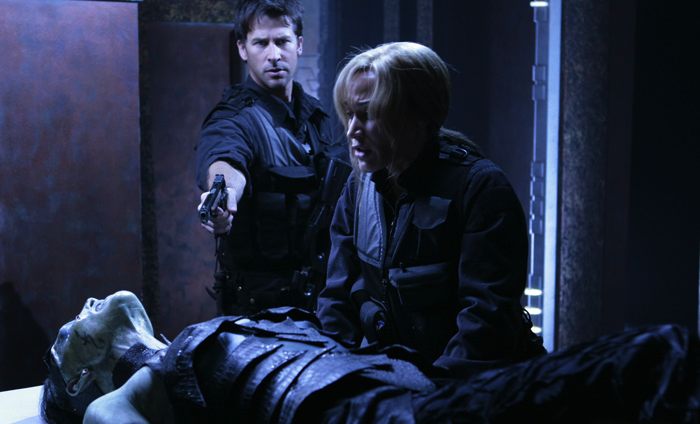
Just in general, the dragging of replicators into Atlantis serves no useful function this season, and will mostly just serve as a method of writing Weir out next season. It feels lazy—hey, SG-1 introduced replicators, why can’t we????—and just doesn’t really work. It also makes for a limp mid-season two-parter, the only bad one of the show’s five.
Having said that, the rest of the season is actually quite strong. For one thing, you’ve got some great bad guys: Connor Trinneer’s Michael makes for an excellent recurring antagonist, Christopher Heyerdahl’s Todd is one of the best characters in Stargate history thanks to the actor’s amazing presence and voice, Robert Davi’s Kolya is always a treat, and even though he’s seriously underused, David Ogden Stiers imbues Oberoth with a chilling menace.
Plus most of the actors and characters all get a chance to stretch themselves and show off a bit. Torri Higginson shows verve and strength in her IOA dealings in “No Man’s Land” and “Misbegotten,” her attempts to see through the delusion in “The Real World,” her hesitant flirting in “Sunday,” and her fights with Ellis in “First Strike.” Joe Flanigan settles in nicely as the action hero, most notably in “Common Ground,” “Phantoms,” “The Return,” and “The Ark.” David Hewlett gets lots of chances to shine, especially working opposite his sister (and another version of himself) in “McKay and Mrs. Miller” and when becoming brilliant in “Tao of Rodney,” plus he and David Nykl’s Zelenka continue their glorious double act of science throughout the season. And even though Ronon and Teyla have become increasingly marginalized, both Jason Momoa (“Sateda”) and Rachel Luttrell (“Phantoms,” “The Ark,” “Submersion”) make the best of the few opportunities they’ve been given. Even the recurring characters get their moments, from Zelenka’s chess mastery and Lorne’s painting in “Sunday” to the brilliantly realized, politically loaded conversation between Woolsey and Caldwell in “Misbegotten.”
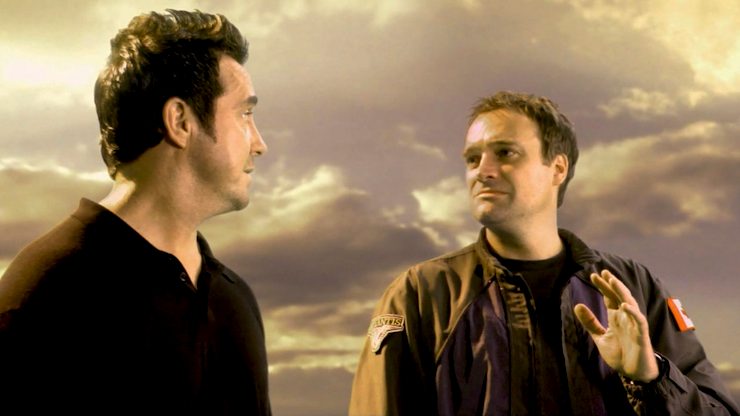
Oddly, I realized that I couldn’t find anything good for Paul McGillion. All his best moments are in other seasons, it seems, and that may be partly why I was so unmoved by “Sunday”—besides how incredibly manipulative the episode is, anyhow. But he also was much less of a compelling presence prior to “Sunday,” without the retrovirus storyline to focus on. (And his participation in “The Return” was one of that two-parter’s many flaws, as his presence on the rescue mission was just pointless, an obvious sop to his presence in the opening credits rather than having a real story reason for it.)
Still, overall this was a much stronger season that I was giving it credit for. Yes, the replicators were a mistake, but they did give us a strong season finale. And overall, there were just a lot of really strong episodes here.
Keith R.A. DeCandido is involved with two nifty Kickstarters, one for a superhero anthology called The Side of Good/The Side of Evil (in which Keith will have a story), the other for a web series that combines 50s and 60s pulp sci-fi with a modern sensibility (think Buckeroo Banzai meets Emma Peel) starring Singularity & Co.’s Cici James called Atomic Annie (for which Keith will be putting together a short-story anthology).










